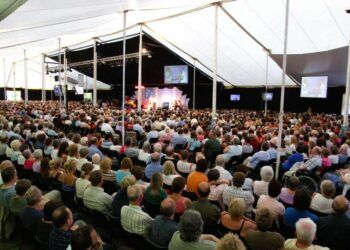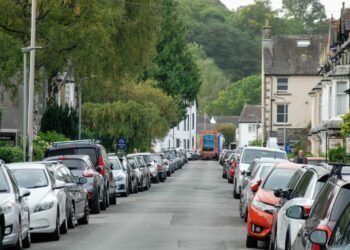
Nobbut Laiking, by Ross Brewster
Those crumbling school buildings. Ah yes, they’re the fault of us millionaire old age pensioners sitting on our dosh while public buildings come crashing to the ground.
I’ve never read such nonsense as the comments emanating from a charity, the Intergenerational Foundation, which claims to promote fairness between young and old.
Correct. Pensioners did get a rise under the triple lock, but the suggestion that 1 in 4 of OAPs are living in “millionaire households” is rather stretching it. I don’t know many millionaire pensioners, perhaps readers live in more exalted financial company. Maybe you know Del Boy.
Being old is no fun. I remember a 1950s song by Tennessee Ernie Ford. “You load sixteen tons and what do you get? Another day older and deeper in debt.” In the case of us oldies, you can add arthritis to that lament.
I don’t think there’s ever been a time when older people have felt so marginalised in society.
There’s a sort of keep up or stay silent, you’ve had your day mentality. How much longer before the farewell to life pill is compulsory for all over 75s? Save a few quid for the government that would and take a big burden off the NHS who would no longer have to contend with daft oldies turning up at A&E with their broken hips.
Mr Angus Hanton, spokesman for the charity which frankly is not very charitable towards our senior citizens, says continuing with the triple lock when 25 per cent of OAPs are living on millionaire’s row, is “another example of generational unfairness baked into government spending decisions”.
He reckons, by calculations based on some rather old figures, that the £11 billion a year given to pensioners could mend every school roof and wall in England and that the government should be switching that money from wealthy oldsters to “needy young people”.
In his quest to promote fairness I would suggest that what Mr Hanton and his charity are doing is driving a wedge between young and old, creating resentment and envy.
There’s this hint in the background that the boomer generation somehow made its millions the easy way. Well, I will agree my generation had the best of it in so far as wars were fought in distant lands, we lived in the magical sixties and we witnessed the advances in technology. And no, I fear for the kind of world my grandchildren will inherit. I don’t think what we are handing on to them is to our great credit.
But a lot of today’s older generation grafted hard. There was no magic money tree then either. Life today can be confusing. We keep hearing about inclusivity, yet it never seems to apply to older people who, unless they can master computers and the inevitable smartphones, find themselves hugely disadvantaged. Most don’t even have a bank or familiar shops any more and, for those who still prefer to spend cash, even the Royal Mint has suspended the production of 2p coins.
Whether you are a millionaire or a pauper, I can vouch for the greatest dis-benefit of old age — the misery of arthritic joints in the morning. No triple lock can avoid that ache.
The wellbeing of a generation of young people cannot be ignored
We’re never going to go back to the old concept of National Service with its uniforms, drill and marching. My brother returned from his period of service in Germany with one arm as a result of an accident.
But something has to be done about the mental state of young people. Last year a million under 18s were referred to mental health services for treatment and the UK hit a four-decade high record for suicide rates among 15 to 19-year-olds.
Many youngsters have lost their sense of pride in the country, they feel alienated from society and millions are inactive.
Thoughts of a new national service scheme are emerging to give young people purpose, improve skills to help them get jobs, tackle the loneliness and mental health problems and create a bond with society.
Harking back to the post-war days of National Service is futile. A new initiative is needed. Already thousands of young people take part in adventure breaks in areas like the Lake District. There is public support for a national service program that would develop the personal skills of young people while giving back to the community.
Too many of our young people are disengaged with society and problems have been brewing since the pandemic. The wellbeing and mental health of a generation of young people can not be ignored.
Warning, these Herdwicks are vicious!
We locals can get a bit tetchy come the start of September when we’ve undergone the rigours of another main tourist season.
Drivers parking where they shouldn’t, jaywalkers, a proliferation of incontinent dogs, and the sudden discovery that Catbells can be climbed without ropes.
In the Canary Islands they’ve got “tourism phobia”. Over there locals have been putting up signs — beware of jellyfish, falling rocks and contaminated water. Underneath there is a note in Spanish to say it’s fake, written to scare off the English visitors.
Perhaps a Cumbrian dialect translation for the Lakes?








